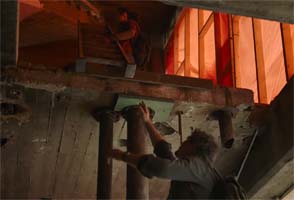I always thought that The Last of Us was an overrated video game. It was good, sure, don't get me wrong. But I never thought that it was the "pinnacle of story-telling in gaming", as many of its biggest fans suggested. To me, it was a good zombie story about the risk of closing ourselves off from each other, which was stapled to a good cover-based shooter. But, to me, the whole always felt like less than the sum of its parts. The gameplay of The Last Of Us was always more about setting a tone than about telling the story. And if your gameplay isn't helping to tell the story, then, as far as I'm concerned, you're not a particularly good example of the interactive video game medium.
So when HBO announced that it would be producing a TV mini-series adapting The Last Of Us, my initial reaction was "why bother?". Like with so many modern remakes, reboots, and adaptations of barely 10-year-old media, I felt like the original is fine, and if you want to watch a Last Of Us movie, you could just hop on YouTube and watch a compilation of all the cutscenes. Honestly, you wouldn't be missing much by ignoring any of the actual game -- let alone by not playing it yourself.
Very little of The Last Of Us' gameplay informed the story in any meaningful way.
Well, HBO's streaming series manages to simultaneously vindicate that feeling, while also showcasing that The Last Of Us does actually benefit from being adapted into the medium that it was always better suited for anyway. The creators of the video game, themselves, in adapting the game, basically cut out all of the actual video game. Virtually nothing that the player ever has to do in The Last of Us was translated to the TV show. It's as if all the actual video game was never really important at all to telling the story. The TV show basically adapts all the cutscenes, telling the same basic story -- sometimes better than the game did -- and without all the meddlesome video game getting in the way.
In the entire 10-episode mini-series, there is [I think] two scenes of our characters having to sneak past infected -- one of which is a flashback. And not a single one of the multitude of scenes in which Joel and Ellie are ambushed by random raiders is adapted at all. Seriously, the characters keep talking about how dangerous it is outside of the quarantined cities because of raiders, but yet we never once see any actual raiders. The closest we come is the ambush by the revolutionaries in Kansas City. Then there are a couple scenes of Joel and Ellie getting ladders or unlocking doors for each other, which was about the only part of the game that ever contributed to the story-telling by reinforcing the relationship and growing inter-dependence of the characters.
Under most circumstances, I would say that adapting a game by cutting out so much of the game would be a "bad thing". In this case, however, it isn't. It might actually be an improvement. I always felt like the bulk of the gameplay in The Last Of Us was just filler anyway. All the actual story -- all the stuff that everybody remembers and loves -- happens outside of the player's control.
 The Last Of Us Episode 2, © HBO, Sony Television.
The Last Of Us Episode 2, © HBO, Sony Television.
 The Last Of Us Episode 9, © HBO, Sony Television.
The Last Of Us Episode 9, © HBO, Sony Television.
Very little of The Last Of Us' gameplay was adapted into the TV show.
The growing fungal threat
The TV mini-series doesn't only cut gameplay content out; it also adds quite a bit new story, and changes things here and there. There are a lot of flashbacks to the days before the outbreak, and to the early days of the outbreak. These serve to provide additional characterization for Sarah, in order to make her a more fully-fleshed out character. It also provides backstory regarding the origin of the mutated cordyceps, and why Ellie is immune.
When The Last of Us released back in 2013, the idea of a cordyceps apocalypse was kind of laughable. Fungi can infect insects, but they cannot survive in the warmer bodies of mammals. The worst that humans have to worry about is topical infections like athlete's foot or yeast infections.
However, as the show points out in its opening minutes, there is actual growing concern from infectious disease experts that climate change could actually cause fungi to become a serious infectious hazard to humans. The reason for this is that the rising temperatures of the Earth (due to human-induced climate change) is causing many fungal species to adapt to warmer temperatures. Even just adding a couple extra degrees of temperature tolerance would be enough for certain fungi to survive in the warm-blooded bodies of mammals and cause serious illness. Cordyceps would need a lot more mutation than just a couple extra degrees of temperature tolerance in order for it to become a threat to humans, but other fungi (such as the yeast Candida Auris) have already begun causing serious illness to humans.
[More]